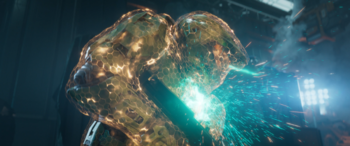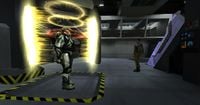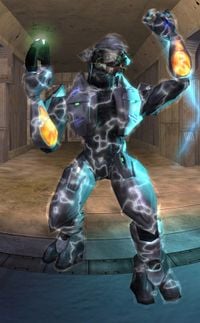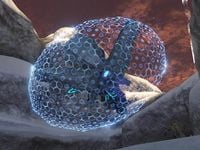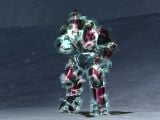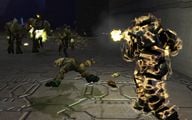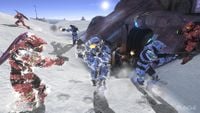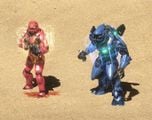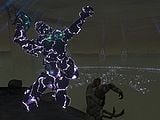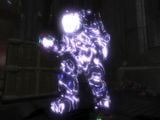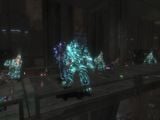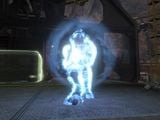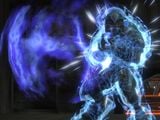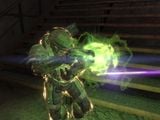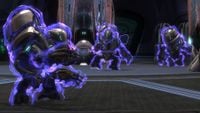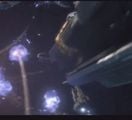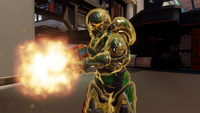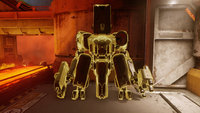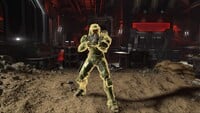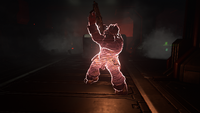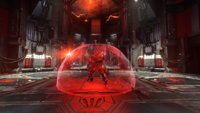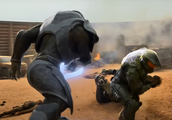Energy shielding: Difference between revisions
From Halopedia, the Halo wiki
Sith Venator (talk | contribs) |
|||
| (200 intermediate revisions by 72 users not shown) | |||
| Line 1: | Line 1: | ||
{{ | {{Status|Canon}} | ||
[[File:HINF MjolnirShieldFlare.png|thumb|350px|The PANSPEC energy shielding on [[John-117]]'s [[MJOLNIR Powered Assault Armor (GEN3)|MJOLRNIR [GEN3]]] after taking several plasma bolts.]] | |||
[[ | '''Energy shielding''' is an advanced defensive technology making use of a field of energized particles that wraps around a surface, which deflects objects that attempt to impact the surface. Most energy shields are able to deflect various forms of damage, from material projectiles to [[directed-energy weapon|directed energy streams]]. Several [[United Nations Space Command|UNSC]], [[Covenant]] and [[Forerunner]] [[:Category:Vehicles|vehicles]], [[:Category:Equipment|devices]], and [[armor]] systems make use of energy shielding to protect users from harm. | ||
Several [[UNSC]], [[Covenant]] and [[Forerunner]] vehicles, devices and armor systems make use of | |||
==Human energy shielding== | ==Human energy shielding== | ||
[[ | [[File:HCE ShieldTest.jpg|thumb|200px|Testing the shields on [[John-117]]'s [[MJOLNIR Powered Assault Armor|Mark V MJOLNIR armor]].]] | ||
[[ | [[Human]]s have used energy shield technology for a relatively brief amount of time. The earliest known example is the "[[Z-4190 bubble shield|bubble shield]]", a protective device developed and deployed by the [[Office of Naval Intelligence]]'s [[Beta-5 Division]],<ref name="Manual">'''Halo: Reach''' manual</ref> which has been in service since at least [[2544]].<ref name="Package">'''Halo: Legends:''' ''The Package''</ref> The Beta-5 Division also utilizes the "[[drop shield]]", a similar device which, despite being less resilient than the bubble shield, is capable of regenerating organic tissue through unknown means.{{Ref/Reuse|Manual}} | ||
Near the end of the [[Human-Covenant War]], ONI scientists successfully reverse-engineered the technology used in [[Kig-Yar point defense gauntlet]]s, leading to the technology's incorporation into the [[MJOLNIR Powered Assault Armor/Mark V|Mark V MJOLNIR Powered Assault Armor]] and all later iterations of the series. Energy shielding technology had previously been tested with the [[MJOLNIR Powered Assault Armor/Mark IV(G)|Grenadier variant]] of the [[MJOLNIR Powered Assault Armor/Mark IV]],<ref>'''Halo: Reach''', ''The Armory''</ref> though these tests were not successful.<ref>'''[[Dr. Halsey's personal journal]]'''</ref> The UNSC also reverse-engineered an [[armor lock|"armor lock" plug-in module]] from functionally identical Covenant technology. In conjunction with the MJOLNIR armor's lock-down system, this device emits an impervious shield barrier that can deflect all small arms fire and can shed attached plasma grenades. The [[SPARTAN-III program|SPARTAN-III]] [[Headhunters]] wear an advanced version of the standard-issue [[Semi-Powered Infiltration armor]] which features energy shields that are similar to those of MJOLNIR, though the shields share power with the suit's [[active camouflage]] module.<ref>'''Halo: Evolutions - Essential Tales of the Halo Universe''', ''Headhunters''</ref> With each new generation of armor, the shields were improved, an [[Unidentified master gunnery sergeant]] commenting that the [[MJOLNIR Powered Assault Armor/Mark VI|Mark VI's]] shields were "much better than the Covenant tech we used for the Mark V."{{Ref/Level|H2|[[The Armory]]}} | |||
One of the | The UNSC has also developed [[energy barrier]]s which are used to separate pressurized areas, such as [[hangar bay]]s, from the vacuum of space. One of the UNSC's most recent breakthroughs in energy shield development came with the creation of the [[FSS-1000 Sabre]] orbital fighter, which is the first human spacecraft known to use energy shields. The post-war [[Mantis]] is another UNSC vehicle that utilizes energy shields. The post-war successor to the Longsword and Sabres, the [[F-41 Broadsword]], is equipped with energy shields, though not powerful enough to travel through Slipspace.<ref>[http://halo.xbox.com/en-US/Universe/detail/halo-4-mantis-trailer/5c5bc6fb-7cb0-4552-be8e-d6f54ed5c417 '''Halo Waypoint:''' ''Mantis Trailer'']</ref> Some warships also received shields post-war, with at least the {{UNSCShip|Infinity}}, its embarked [[Strident-class heavy frigate|frigates]], and the {{Class|Autumn|heavy cruiser}} possessing energy shielding.<ref>[[:File:H4FrigateShields.jpeg|Image showing frigate shields above hull]]</ref> | ||
==Covenant energy shielding== | |||
[[File:H2 Sangheili Shielding.jpg|thumb|200px|A Sangheili's energy shield flaring.]] | |||
The Covenant make extensive use of energy shielding technology. Nearly all Covenant starships larger than a [[dropship]] use energy shields and several ground-based structures use shields as well. Many Covenant warriors are equipped with energy shields. | |||
== | ===Personal shielding=== | ||
[[ | Most [[Sangheili]], many [[Jiralhanae]], and some high-ranking [[Unggoy]] and [[Yanme'e]] are equipped with [[Sangheili personal energy shield|energy shields that are integrated into the wearer's armor]], or, in the latter case, carapace. [[Kig-Yar]] warriors use [[Kig-Yar point defense gauntlet|energy shield gauntlets]] that protect them from most oncoming fire but leaves them vulnerable to flanking attacks and grenades. The Covenant often use [[Huragok]] to provide energy shielding to troops on the battlefield. The Covenant also utilize [[overshield]]s, which provide additional layers of energy shielding to the wearer, and [[Regenerator|energy shield regenerators]]. Sangheili and Jiralhanae warriors sometimes use armor lock systems, from which the UNSC technology was reverse-engineered; Jiralhanae are able to use this technology even without [[Jiralhanae power armor|power armor]]. | ||
Though the [[Hierarchs]] are not meant to encounter combat, their [[anti-gravity chair]]s emit powerful energy shields. They are able to deflect all forms of projectile, plasma, and explosive weaponry and seemingly never become depleted. However, one can simply walk through the shield. The shield used by [[Tartarus]], the [[Chieftain of the Jiralhanae]], was much different and seems to have to be actively turned on. His shield could deflect nearly all attacks save for those of a captured [[Type-50 particle beam rifle|beam rifle]]. A similar, though much less potent, technology is often used by [[Jiralhanae Chieftain|Jiralhanae chieftains]]; this "[[invincibility]]" device lasts only a matter of seconds, though it renders the user impervious to small arms fire. The device can also be used by personnel who do not otherwise possess energy shielding, such as UNSC [[Orbital Drop Shock Trooper]]s.<ref>'''Halo 3: ODST'''</ref> | |||
===Spacecraft shielding=== | |||
Nearly all Covenant vessels are protected by highly resistant energy shields. These shields can withstand an impressive amount of firepower and can recharge very quickly. Covenant vessels' shields can absorb almost all missile fire, including hundreds of [[Archer missile]]s and even a low-yield {{Class|Shiva|nuclear missile}}, although Shiva nukes will usually deplete their shields, making them vulnerable to smaller weapons. The only UNSC weapons capable of penetrating a Covenant starship's shield are the [[Magnetic Accelerator Cannon]]s. Even then, ship-based MACs take multiple rounds to drop the shields; only high powered starship or a "Super MAC" round from an [[orbital defense platform]] can penetrate a Covenant ship's shields in one hit. | |||
Covenant starship shielding does have a notable flaw, however: Whenever a starship launches a [[plasma torpedo]] or [[pulse laser turret|pulse laser]], a small section of the energy shield must drop to allow the weapon to fire. Otherwise, the energy released would detonate on the inside of the shields, damaging the ship. | |||
While projectile weaponry is generally ineffective against Covenant starship shielding, [[directed energy weapon]]ry can disable shields with relative ease, in much the same manner as Sangheili energy shields. Another way to disable the shipboard energy shields is through the use of a large-scale electromagnetic pulse.<ref>'''[[Halo: The Fall of Reach]]''', page 153</ref> | |||
The Covenant's [[Morsam-pattern Seraph|Type-31 "Seraph" fighters]] are typically equipped with energy shields, though this does not seem to always be the case.{{Ref/Reuse|Package}} {{Pattern|R'shwupa|Phantom}}s are equipped with powerful shields that can deflect cannon fire but are vulnerable to missiles due to their lower velocity.<ref name="LNoS">'''Halo: Reach''', campaign level ''[[Long Night of Solace (level)|Long Night of Solace]]''</ref> | |||
The Covenant also use energy shields as [[hangar bay]] doors. These devices prevent the evacuation of atmosphere from the hangar bay and deny unwanted entry and exit. They can be phased in such a manner that atmosphere remains in the hangar bay while single ships can enter the vessel.{{Ref/Reuse|LNoS}} | |||
== | ===Vehicle shielding=== | ||
Few Covenant ground and air vehicles are equipped with energy shields. The most notable exception is the {{Pattern|Shua'ee|Locust}}, a repurposed mining platform that is used as a "building killer". The Type-30 Locust emits a spherical shield that can resist most high-impact projectiles. However, this shield is rather weak and will dissipate under concentrated fire, exposing the Type-30 Locust's vulnerable hull. [[Karo'etba-pattern Ghost|Type-32 "Ghost" assault vehicles]] and [[Zurdo-pattern Wraith|Type-26 "Wraith" tanks]], while almost universally unshielded, can be retrofitted with energy shields that deflect most projectiles. The {{Pattern|D'nomlhe|Banshee}}, the [[Post-Covenant War conflicts|post-Covenant War]] successor to the [[Type-26 Banshee]], features numerous improvements, one of which is the implementation of energy shielding.<ref>'''[[Halo 5: Guardians]]'''</ref> | |||
===Stationary shielding=== | |||
The Covenant make extensive use of stationary energy shield devices. One of the most common is the energy barrier, which is used to cordon off restricted areas and to deny enemy movement within invaded cities.<ref>'''Halo 3: ODST''', campaign levels ''[[Mombasa Streets]]'', ''[[Tayari Plaza]]'', and''[[Kizingo Boulevard]]''</ref> This technology can also be used to form [[anti-vehicle barrier]]s; though vehicles and projectiles are repelled by these barriers, human and Covenant soldiers can pass through them on foot.<ref>'''Halo 3''', campaign level ''[[Tsavo Highway]]''</ref><ref>'''Halo Wars''', campaign level ''[[Relic Approach]]''</ref> [[Covenant portable shield|Smaller-scale barriers]], including [[Deployable Cover|man-portable ones]], are often used to provide cover during firefights. | |||
The | [[Covenant citadel|Pre-fabricated Covenant bases]] are often outfitted with [[Covenant shield generator|shield generators]]; multiple shield generators can be installed at a base to provide incrementally greater protection.<ref>'''Halo Wars'''</ref> The Covenant sometimes use enormous energy shield domes to cover large areas, such as bases. These domes sometimes have no apparent power source,<ref name="Dome">'''Halo Wars''', campaign level ''[[Dome of Light]]''</ref> though they are also used on [[Deployment spire|teleportation spires]], which are commonly used during invasions.<ref name="ToTS">'''Halo: Reach''', campaign level ''[[Tip of the Spear]]''</ref> These shield domes are susceptible to high-intensity plasma.{{Ref/Reuse|Dome}} While Covenant aircraft can pass through these shields unharmed,{{Ref/Reuse|Dome}} UNSC aircraft that pass through the field receive a powerful [[electromagnetic pulse]] and suffer catastrophic systems failures.{{Ref/Reuse|ToTS}} | ||
Some [[Shade]] turrets are equipped with energy shielding. Some lighter versions have only frontal shielding, while [[Shade#Anti-air Shade|anti-aircraft models]] have multi-directional shielding. | |||
== | ==Forerunner energy shielding== | ||
[[File:H3 Sentinel Shielding.jpg|thumb|200px|A Sentinel's energy shield.]] | |||
Many Forerunner constructs make use of energy shielding. Standard Forerunner [[Sentinel]]s are encased within an ovoid energy shield that can withstand moderate damage, while the [[Onyx Sentinel|much more powerful Sentinels]] from the [[Onyx]] [[Shield World]] possess spherical golden shields that activate whenever a fast-moving projectile approaches. The larger [[Enforcer]]s possess three-part energy shields that protect their photoreceptors and chassis from frontal assault, but do not protect against attack from any other angle. The majority of Forerunner energy shields seem to consist of a translucent bubble composed of hexagonal patterns, as opposed to the wraparound shields typically used by the Covenant and UNSC. | |||
The [[Ur-Didact|Didact's]] ship, ''[[Mantle's Approach]]'' possessed powerful energy shields: they were able to withstand Earth's [[Orbital defense platform|super MAC platforms]] with no damage. ''Infinity'''s specialized fore [[Magnetic Accelerator Cannon|MAC guns]] were able to penetrate them, but only caused minimal hull damage. The Didact also used shields to protect his [[Cryptum]] on [[Requiem]] and the [[Composer]]'s control area on ''Mantle's Approach.'' [[Cortana]] was able to fool the former shield with an override code and overload the latter with her [[Rampancy|rampant]] personalities. | |||
The Forerunners made ubiquitous use of [[hard light]] technology, consisting of solidified photon-boson fields shaped into any desired form,<ref>[http://us2.campaign-archive1.com/?u=8efbd7b88156ac5f6faed8b69&id=4fdccf0da5&e=7be5970a3b '''Mega Bloks''', Special Report: ONI REAP-X]</ref> such as [[light bridge]]s. Hard light was also used to create [[Z-90 hardlight shield|infantry-issue shields]]. | |||
{{clear}} | |||
==Gameplay== | |||
*The placement of the player's shield meter has undergone several changes over the years: | |||
**In ''Halo: Combat Evolved'', the status of the energy shield is shown at the top-right corner of the screen above the health bar. | |||
**In ''Halo 2'', the shield meter is in the bottom-left above the motion tracker. | |||
**In ''Halo 3'', the shield meter is in the top-center of the screen. | |||
**In ''Halo: Reach'', the shield meter is shown in the top-center of the screen above the health bar. | |||
**In ''Halo 4'', the shield meter is again shown in the top-center of the screen, but there is no visible health bar. | |||
**In ''Halo 5: Guardians'' and ''Halo Infinite'', the health bar is visible and the shield meter appears above it once more. | |||
*In [[multiplayer]], players can have 50%, 100%, 200%, 300%, 400%, 500%, 1000%, or 2000% shield strength, or none at all--this can be further augmented if they pick up an overshield. | |||
*In ''Halo 2'' and ''Halo 3'', both Elites and Spartans have the same amount of shielding; in ''Halo: Reach'', Elites have more shielding (but less health) than Spartans. | |||
*In ''Halo: Combat Evolved'', during the level [[Two Betrayals]], energy shielding was used to overload [[Installation 04]]'s pulse generators. | |||
*The amount of time it takes for the shields to regenerate in each Halo game has changed: | |||
**In ''Halo: Combat Evolved'' under standard game settings, energy shields begin regenerating 5 seconds after last being hit and take four seconds to fully recharge from a total drain. | |||
***In the Campaign, the shield regenerates at a fixed ratio of shield points per second, and the low shield tone activates at a fixed shield percentage. Because the difficulty affects shield strength, it takes 8 seconds on Easy to recharge from a full drain, which is so long that the recharge sound plays twice; the low shield tone plays for the first two seconds of regeneration. | |||
**In ''Halo 2'' under standard game settings, energy shields begin regenerating 4.25 seconds after last being hit, and take 1.75 seconds to fully recharge from a total drain. | |||
**In ''Halo 3'' under standard game settings, energy shields begin regenerating 5 seconds after last being hit, and take 2 seconds to fully recharge from a total drain. | |||
*In ''Halo 4'', during the level [[Forerunner (level)|Forerunner]], energy shielding was used to enhance a {{Pattern|Karo'etba|Ghost}}'s boosting. | |||
*In ''Halo 4'', during the level [[Shutdown]], energy shielding was used to generate an EMP which overloaded the communication network's carrier wave generator. | |||
*In ''Halo 5: Guardians'', when a Spartan is revived after being downed, they and the reviver will be granted an [[Overshield]] that drains over time. | |||
*In ''Halo Wars'', most of Covenant vehicles are equipped with energy shielding, while for the UNSC, it is exclusive for Spartan units, including [[Red Team]]. | |||
*In ''Halo Wars 2'', UNSC base defenses can be equipped with energy shield if player upgrades R&D leader power. Some vehicles are also equipped with energy shielding. | |||
==Trivia== | ==Trivia== | ||
* | {{Linkbox|gallery=yes|gallerypage=Images of energy shields}} | ||
* | * The health and shield values have changed from game to game. | ||
*In ''Halo | **The health and shield points in ''Halo: Combat Evolved'' are higher than those in the subsequent games. In ''Halo: Combat Evolved'', both health and shield are given 75 points.{{citation needed}} | ||
**On the other hand, there are only 45 health points and 70 shield points in ''Halo 3''.{{citation needed}} | |||
* Until ''Halo: Reach'', shields regenerating were depicted by a wave of energy traveling up the wearer's body. To better fit with the treatment of shields as an energy field, the animation was changed to bands of energy slowly wrapping around the wearer then fading away. | |||
* In ''Halo Infinite'', energy shields underwent an artistic redesign. Spartan shields now feature a hexagonal pattering, while Brute energy shielding is made up of horizontal lines. | |||
==Gallery== | ==Gallery== | ||
<gallery | <gallery> | ||
File:A Sangheili's | File:HCE_SangheiliShield.jpg|A [[Sangheili Major|Major]] [[Sangheili]]'s shield protecting him from enemy fire in ''Halo: Combat Evolved''. | ||
File: | File:HCE_ShieldStation.gif|[[John-117]], inside the [[UNSC Pillar of Autumn|UNSC ''Pillar of Autumn'']]'s [[energy shield test station]]. | ||
File:H1 Library assault.jpg|John-117's shield protecting him from enemy fire in ''Halo: Combat Evolved'' | |||
File:Halo3 Snowbound-3rdperson-01.jpg|The shields on a twp [[MJOLNIR Powered Assault Armor/Mark VI|MJOLNIR armors]] flare after taking damage in ''Halo 3''. | |||
File:Shield wave 1.jpg|A [[SPARTAN Program|Spartan's]] and Elite's shield recharging in ''Halo 3''. | |||
File:H3 - Elite Energy Shield.jpg|A Sangheili's shields flickering from melee damage in ''Halo 3''. | |||
File:H3ODST_Jiralhanae_Shields.jpg|A Jiralhanae's shields flicker from taking fire in ''Halo 3: ODST''. | |||
File:H3ODST Huragok Overshield.jpg|A Huragok's passive ability which grants all allies within a certain radius overshields seen on this group of Covenant infantry in ''Halo 3: ODST's'' [[Firefight]] level [[Chasm Ten]]. | |||
File:HRBeta_Sangheili_Shields.jpg|A Sangheili's personal energy shield overloading from sustained fire in ''[[Halo: Reach Multiplayer Beta]]''. | |||
File:HRBeta_Sangheili_EnergyShield_Flicker.jpg|An Elite's personal energy shield flickers from taking damage in the beta. | |||
File:HR_Spartan_ShieldFlare.jpg|A [[SPARTAN-III Program|SPARTAN-III]]'s energy shields flicker while taking damage from a [[Type-33 Needler]] projectile. | |||
File:HReach-LNoS-Shielded-Unggoy.jpg|Huragok-supplied shielding on [[Unggoy Ultra]]s in the ''Halo: Reach'' level ''Long Night of Solace''. | |||
File:HR EliteShield Animation.gif|Animation of a Sangheili's shield. | |||
File:H4-Raider-Grifball-02.jpg|Traditional golden shield flicker of the [[MJOLNIR Powered Assault Armor (GEN2)|MJOLNIR GEN2]] in ''[[Halo 4]]''. | |||
File:H4 Exile SAWFirstPerson.jpg|Upclose shield flickering of the GEN2, note the teal color signifying [[overshield]]s. | |||
File:H4FrigateShields.jpeg|Shielding on a ''Strident''-class frigate. | |||
File:H5G-MJOLNIRshielding.png|The shields of a Spartan-IV in ''[[Halo 5: Guardians]]''. | |||
File:H5G-T54Bansheeshielding.png|The energy shielding on a {{Pattern|D'nomlhe|Banshee}}. | |||
File:H5G-Mantisshielding.png|The energy shielding on a [[HRUNTING/YGGDRASIL Mark IX Mantis]] | |||
File:H5G-AV49shielding.png|The energy shielding on an [[AV-49 Wasp]]. | |||
File:H5G-UnggoyBodyguardshields.png|An Unggoy Bodyguard's shields flaring. | |||
File:HW2 Blitz Ghost.png|Blitz card of a Banished Ghost's energy shielding in ''[[Halo Wars 2]]''. | |||
File:HLW-Block.png|[[Linda-058]]'s [[ARGUS-class Mjolnir]]'s energy shielding absorbing turret rounds in ''[[Halo: Lone Wolf]]''. | |||
File:HINF Concept JohnDefendingInfinity.jpg|Concept art of John-117's [[GEN3]] Mark VI PANSPEC energy shields for ''[[Halo Infinite]]''. | |||
File:HINF MarkVIEnergyShield.jpg|John-117's energy shields in ''Halo Infinite''. | |||
File:HINF EliteOfficer.png|A [[Sangheili Enforcer]] and [[Sangheili Mercenary|Mercenary]] with energy shields in ''Halo Infinite''. | |||
File:HINF Ultras.png|A Banished [[Sangheili Ultra]] and an [[Unggoy Bouncer]] with energy shielding in ''Halo Infinite''. | |||
File:HINF shielded brute warrior melee.png|A [[Jiralhanae Warrior]] with energy shielding in ''Halo Infinite''. | |||
File:HINF Escharum Shield.png|[[Escharum]] protected by a specialized energy shield at the [[House of Reckoning (location)|House of Reckoning]]. | |||
File:HTV-energyshields.png|John-117's energy shield flaring from a Covenant Sangheili's energy sword in ''[[Halo: The Television Series]]''. | |||
</gallery> | </gallery> | ||
==List of appearances== | |||
{{Col-begin}} | |||
{{Col-2}} | |||
*''[[Halo: The Fall of Reach]]'' {{1st}} | |||
*''[[Halo: Combat Evolved]]'' | |||
*''[[Halo: The Flood]]'' | |||
*''[[Halo: First Strike]]'' | |||
*''[[Halo 2]]'' | |||
*''[[Halo Graphic Novel]]'' | |||
**''[[The Last Voyage of the Infinite Succor|Last Voyage of the Infinite Succor]]'' | |||
**''[[Armor Testing]]'' | |||
*''[[Halo: Ghosts of Onyx]]'' | |||
*''[[Halo: Uprising]]'' | |||
*''[[Halo 3]]'' | |||
*''[[Halo: Contact Harvest]]'' | |||
*''[[Halo: The Cole Protocol]]'' | |||
*''[[Halo Wars: Genesis]]'' | |||
*''[[Halo Wars]]'' | |||
*''[[Halo: Helljumper]]'' | |||
*''[[Halo 3: ODST]]'' | |||
*''[[Halo Legends]]'' | |||
**''[[Origins]]'' | |||
**''[[Odd One Out]]'' | |||
**''[[Prototype]]'' | |||
**''[[The Package (animated short)|The Package]]'' | |||
*''[[Halo: Evolutions - Essential Tales of the Halo Universe]]'' | |||
**''[[Stomping on the Heels of a Fuss]]'' | |||
**''[[Midnight in the Heart of Midlothian]]'' | |||
**''[[Dirt]]'' | |||
**''[[Headhunters (short story)|Headhunters]]'' | |||
**''[[Blunt Instruments]]'' | |||
**''[[Palace Hotel]]'' | |||
**''[[The Impossible Life and the Possible Death of Preston J. Cole]]'' | |||
**''[[The Return]]'' | |||
*''[[Halo: Blood Line]]'' | |||
*''[[Remember Reach]]'' | |||
**''[[Deliver Hope]]'' | |||
*''[[Halo: Reach]]'' | |||
*''[[Halo: Fall of Reach]]'' | |||
**''[[Halo: Fall of Reach - Boot Camp|Boot Camp]]'' | |||
**''[[Halo: Fall of Reach - Covenant|Covenant]]'' | |||
**''[[Halo: Fall of Reach - Invasion|Invasion]]'' | |||
{{Col-2}} | |||
*''[[Halo: Cryptum]]'' | |||
*''[[Halo: Combat Evolved Anniversary]]'' | |||
**''[[Terminal (Halo: Combat Evolved Anniversary)|Terminals]]'' | |||
*''[[Halo 4]]'' | |||
**''[[Terminal (Halo 4)|Terminals]]'' | |||
**''[[Spartan Ops]]'' | |||
*''[[Halo: Spartan Assault]]'' | |||
*''[[Halo: Initiation]]'' | |||
*''[[Halo: Escalation]]'' | |||
*''[[Halo: Broken Circle]]'' | |||
*''[[Halo 2: Anniversary]]'' | |||
*''[[Halo: Hunters in the Dark]]'' | |||
*''[[Halo: Last Light]]'' | |||
*''[[Halo 5: Guardians]]'' | |||
*''[[Halo: Shadow of Intent]]'' | |||
*''[[Halo Wars 2]]'' | |||
*''[[Halo: Envoy]]'' | |||
*''[[Halo: Retribution]]'' | |||
*''[[Halo: Legacy of Onyx]]'' | |||
*''[[Halo: Bad Blood]]'' | |||
*''[[Halo: Fireteam Raven]]'' | |||
*''[[Halo: Silent Storm]]'' | |||
*''[[Halo: Lone Wolf]]'' | |||
*''[[Halo: Renegades]]'' | |||
*''[[Halo: Oblivion]]'' | |||
*''[[Halo: Shadows of Reach]]'' | |||
*''[[Halo: Divine Wind]]'' | |||
*''[[Halo Infinite]]'' | |||
*''[[Halo: The Television Series]]'' | |||
*''[[Halo: The Rubicon Protocol]]'' | |||
*''[[Halo: Winter Contention]]'' | |||
*''[[Halo: Outcasts]]'' | |||
*''[[Halo: Hippocratica]]'' {{Mo}} | |||
*''[[Halo: The Machine Breaks]]'' | |||
*''[[Halo: Age of Retribution]]'' | |||
*''[[Halo: Flashpoint]]'' | |||
{{Col-end}} | |||
==Sources== | ==Sources== | ||
{{Ref/Sources}} | |||
[[Category:Shield technology| ]] | |||
[[Category: | |||
Latest revision as of 12:15, November 8, 2024
Energy shielding is an advanced defensive technology making use of a field of energized particles that wraps around a surface, which deflects objects that attempt to impact the surface. Most energy shields are able to deflect various forms of damage, from material projectiles to directed energy streams. Several UNSC, Covenant and Forerunner vehicles, devices, and armor systems make use of energy shielding to protect users from harm.
Human energy shielding[edit]
Humans have used energy shield technology for a relatively brief amount of time. The earliest known example is the "bubble shield", a protective device developed and deployed by the Office of Naval Intelligence's Beta-5 Division,[1] which has been in service since at least 2544.[2] The Beta-5 Division also utilizes the "drop shield", a similar device which, despite being less resilient than the bubble shield, is capable of regenerating organic tissue through unknown means.[1]
Near the end of the Human-Covenant War, ONI scientists successfully reverse-engineered the technology used in Kig-Yar point defense gauntlets, leading to the technology's incorporation into the Mark V MJOLNIR Powered Assault Armor and all later iterations of the series. Energy shielding technology had previously been tested with the Grenadier variant of the MJOLNIR Powered Assault Armor/Mark IV,[3] though these tests were not successful.[4] The UNSC also reverse-engineered an "armor lock" plug-in module from functionally identical Covenant technology. In conjunction with the MJOLNIR armor's lock-down system, this device emits an impervious shield barrier that can deflect all small arms fire and can shed attached plasma grenades. The SPARTAN-III Headhunters wear an advanced version of the standard-issue Semi-Powered Infiltration armor which features energy shields that are similar to those of MJOLNIR, though the shields share power with the suit's active camouflage module.[5] With each new generation of armor, the shields were improved, an Unidentified master gunnery sergeant commenting that the Mark VI's shields were "much better than the Covenant tech we used for the Mark V."[6]
The UNSC has also developed energy barriers which are used to separate pressurized areas, such as hangar bays, from the vacuum of space. One of the UNSC's most recent breakthroughs in energy shield development came with the creation of the FSS-1000 Sabre orbital fighter, which is the first human spacecraft known to use energy shields. The post-war Mantis is another UNSC vehicle that utilizes energy shields. The post-war successor to the Longsword and Sabres, the F-41 Broadsword, is equipped with energy shields, though not powerful enough to travel through Slipspace.[7] Some warships also received shields post-war, with at least the UNSC Infinity, its embarked frigates, and the Autumn-class heavy cruiser possessing energy shielding.[8]
Covenant energy shielding[edit]
The Covenant make extensive use of energy shielding technology. Nearly all Covenant starships larger than a dropship use energy shields and several ground-based structures use shields as well. Many Covenant warriors are equipped with energy shields.
Personal shielding[edit]
Most Sangheili, many Jiralhanae, and some high-ranking Unggoy and Yanme'e are equipped with energy shields that are integrated into the wearer's armor, or, in the latter case, carapace. Kig-Yar warriors use energy shield gauntlets that protect them from most oncoming fire but leaves them vulnerable to flanking attacks and grenades. The Covenant often use Huragok to provide energy shielding to troops on the battlefield. The Covenant also utilize overshields, which provide additional layers of energy shielding to the wearer, and energy shield regenerators. Sangheili and Jiralhanae warriors sometimes use armor lock systems, from which the UNSC technology was reverse-engineered; Jiralhanae are able to use this technology even without power armor.
Though the Hierarchs are not meant to encounter combat, their anti-gravity chairs emit powerful energy shields. They are able to deflect all forms of projectile, plasma, and explosive weaponry and seemingly never become depleted. However, one can simply walk through the shield. The shield used by Tartarus, the Chieftain of the Jiralhanae, was much different and seems to have to be actively turned on. His shield could deflect nearly all attacks save for those of a captured beam rifle. A similar, though much less potent, technology is often used by Jiralhanae chieftains; this "invincibility" device lasts only a matter of seconds, though it renders the user impervious to small arms fire. The device can also be used by personnel who do not otherwise possess energy shielding, such as UNSC Orbital Drop Shock Troopers.[9]
Spacecraft shielding[edit]
Nearly all Covenant vessels are protected by highly resistant energy shields. These shields can withstand an impressive amount of firepower and can recharge very quickly. Covenant vessels' shields can absorb almost all missile fire, including hundreds of Archer missiles and even a low-yield Shiva-class nuclear missile, although Shiva nukes will usually deplete their shields, making them vulnerable to smaller weapons. The only UNSC weapons capable of penetrating a Covenant starship's shield are the Magnetic Accelerator Cannons. Even then, ship-based MACs take multiple rounds to drop the shields; only high powered starship or a "Super MAC" round from an orbital defense platform can penetrate a Covenant ship's shields in one hit.
Covenant starship shielding does have a notable flaw, however: Whenever a starship launches a plasma torpedo or pulse laser, a small section of the energy shield must drop to allow the weapon to fire. Otherwise, the energy released would detonate on the inside of the shields, damaging the ship.
While projectile weaponry is generally ineffective against Covenant starship shielding, directed energy weaponry can disable shields with relative ease, in much the same manner as Sangheili energy shields. Another way to disable the shipboard energy shields is through the use of a large-scale electromagnetic pulse.[10]
The Covenant's Type-31 "Seraph" fighters are typically equipped with energy shields, though this does not seem to always be the case.[2] R'shwupa-pattern Phantoms are equipped with powerful shields that can deflect cannon fire but are vulnerable to missiles due to their lower velocity.[11]
The Covenant also use energy shields as hangar bay doors. These devices prevent the evacuation of atmosphere from the hangar bay and deny unwanted entry and exit. They can be phased in such a manner that atmosphere remains in the hangar bay while single ships can enter the vessel.[11]
Vehicle shielding[edit]
Few Covenant ground and air vehicles are equipped with energy shields. The most notable exception is the Shua'ee-pattern Locust, a repurposed mining platform that is used as a "building killer". The Type-30 Locust emits a spherical shield that can resist most high-impact projectiles. However, this shield is rather weak and will dissipate under concentrated fire, exposing the Type-30 Locust's vulnerable hull. Type-32 "Ghost" assault vehicles and Type-26 "Wraith" tanks, while almost universally unshielded, can be retrofitted with energy shields that deflect most projectiles. The D'nomlhe-pattern Banshee, the post-Covenant War successor to the Type-26 Banshee, features numerous improvements, one of which is the implementation of energy shielding.[12]
Stationary shielding[edit]
The Covenant make extensive use of stationary energy shield devices. One of the most common is the energy barrier, which is used to cordon off restricted areas and to deny enemy movement within invaded cities.[13] This technology can also be used to form anti-vehicle barriers; though vehicles and projectiles are repelled by these barriers, human and Covenant soldiers can pass through them on foot.[14][15] Smaller-scale barriers, including man-portable ones, are often used to provide cover during firefights.
Pre-fabricated Covenant bases are often outfitted with shield generators; multiple shield generators can be installed at a base to provide incrementally greater protection.[16] The Covenant sometimes use enormous energy shield domes to cover large areas, such as bases. These domes sometimes have no apparent power source,[17] though they are also used on teleportation spires, which are commonly used during invasions.[18] These shield domes are susceptible to high-intensity plasma.[17] While Covenant aircraft can pass through these shields unharmed,[17] UNSC aircraft that pass through the field receive a powerful electromagnetic pulse and suffer catastrophic systems failures.[18]
Some Shade turrets are equipped with energy shielding. Some lighter versions have only frontal shielding, while anti-aircraft models have multi-directional shielding.
Forerunner energy shielding[edit]
Many Forerunner constructs make use of energy shielding. Standard Forerunner Sentinels are encased within an ovoid energy shield that can withstand moderate damage, while the much more powerful Sentinels from the Onyx Shield World possess spherical golden shields that activate whenever a fast-moving projectile approaches. The larger Enforcers possess three-part energy shields that protect their photoreceptors and chassis from frontal assault, but do not protect against attack from any other angle. The majority of Forerunner energy shields seem to consist of a translucent bubble composed of hexagonal patterns, as opposed to the wraparound shields typically used by the Covenant and UNSC.
The Didact's ship, Mantle's Approach possessed powerful energy shields: they were able to withstand Earth's super MAC platforms with no damage. Infinity's specialized fore MAC guns were able to penetrate them, but only caused minimal hull damage. The Didact also used shields to protect his Cryptum on Requiem and the Composer's control area on Mantle's Approach. Cortana was able to fool the former shield with an override code and overload the latter with her rampant personalities.
The Forerunners made ubiquitous use of hard light technology, consisting of solidified photon-boson fields shaped into any desired form,[19] such as light bridges. Hard light was also used to create infantry-issue shields.
Gameplay[edit]
- The placement of the player's shield meter has undergone several changes over the years:
- In Halo: Combat Evolved, the status of the energy shield is shown at the top-right corner of the screen above the health bar.
- In Halo 2, the shield meter is in the bottom-left above the motion tracker.
- In Halo 3, the shield meter is in the top-center of the screen.
- In Halo: Reach, the shield meter is shown in the top-center of the screen above the health bar.
- In Halo 4, the shield meter is again shown in the top-center of the screen, but there is no visible health bar.
- In Halo 5: Guardians and Halo Infinite, the health bar is visible and the shield meter appears above it once more.
- In multiplayer, players can have 50%, 100%, 200%, 300%, 400%, 500%, 1000%, or 2000% shield strength, or none at all--this can be further augmented if they pick up an overshield.
- In Halo 2 and Halo 3, both Elites and Spartans have the same amount of shielding; in Halo: Reach, Elites have more shielding (but less health) than Spartans.
- In Halo: Combat Evolved, during the level Two Betrayals, energy shielding was used to overload Installation 04's pulse generators.
- The amount of time it takes for the shields to regenerate in each Halo game has changed:
- In Halo: Combat Evolved under standard game settings, energy shields begin regenerating 5 seconds after last being hit and take four seconds to fully recharge from a total drain.
- In the Campaign, the shield regenerates at a fixed ratio of shield points per second, and the low shield tone activates at a fixed shield percentage. Because the difficulty affects shield strength, it takes 8 seconds on Easy to recharge from a full drain, which is so long that the recharge sound plays twice; the low shield tone plays for the first two seconds of regeneration.
- In Halo 2 under standard game settings, energy shields begin regenerating 4.25 seconds after last being hit, and take 1.75 seconds to fully recharge from a total drain.
- In Halo 3 under standard game settings, energy shields begin regenerating 5 seconds after last being hit, and take 2 seconds to fully recharge from a total drain.
- In Halo: Combat Evolved under standard game settings, energy shields begin regenerating 5 seconds after last being hit and take four seconds to fully recharge from a total drain.
- In Halo 4, during the level Forerunner, energy shielding was used to enhance a Karo'etba-pattern Ghost's boosting.
- In Halo 4, during the level Shutdown, energy shielding was used to generate an EMP which overloaded the communication network's carrier wave generator.
- In Halo 5: Guardians, when a Spartan is revived after being downed, they and the reviver will be granted an Overshield that drains over time.
- In Halo Wars, most of Covenant vehicles are equipped with energy shielding, while for the UNSC, it is exclusive for Spartan units, including Red Team.
- In Halo Wars 2, UNSC base defenses can be equipped with energy shield if player upgrades R&D leader power. Some vehicles are also equipped with energy shielding.
Trivia[edit]

|
Browse more images in this article's gallery page. |
- The health and shield values have changed from game to game.
- The health and shield points in Halo: Combat Evolved are higher than those in the subsequent games. In Halo: Combat Evolved, both health and shield are given 75 points.[citation needed]
- On the other hand, there are only 45 health points and 70 shield points in Halo 3.[citation needed]
- Until Halo: Reach, shields regenerating were depicted by a wave of energy traveling up the wearer's body. To better fit with the treatment of shields as an energy field, the animation was changed to bands of energy slowly wrapping around the wearer then fading away.
- In Halo Infinite, energy shields underwent an artistic redesign. Spartan shields now feature a hexagonal pattering, while Brute energy shielding is made up of horizontal lines.
Gallery[edit]
John-117, inside the UNSC Pillar of Autumn's energy shield test station.
The shields on a twp MJOLNIR armors flare after taking damage in Halo 3.
A Spartan's and Elite's shield recharging in Halo 3.
A Sangheili's personal energy shield overloading from sustained fire in Halo: Reach Multiplayer Beta.
A SPARTAN-III's energy shields flicker while taking damage from a Type-33 Needler projectile.
Huragok-supplied shielding on Unggoy Ultras in the Halo: Reach level Long Night of Solace.
Traditional golden shield flicker of the MJOLNIR GEN2 in Halo 4.
Upclose shield flickering of the GEN2, note the teal color signifying overshields.
The shields of a Spartan-IV in Halo 5: Guardians.
The energy shielding on a D'nomlhe-pattern Banshee.
The energy shielding on a HRUNTING/YGGDRASIL Mark IX Mantis
The energy shielding on an AV-49 Wasp.
Blitz card of a Banished Ghost's energy shielding in Halo Wars 2.
Linda-058's ARGUS-class Mjolnir's energy shielding absorbing turret rounds in Halo: Lone Wolf.
Concept art of John-117's GEN3 Mark VI PANSPEC energy shields for Halo Infinite.
A Sangheili Enforcer and Mercenary with energy shields in Halo Infinite.
A Banished Sangheili Ultra and an Unggoy Bouncer with energy shielding in Halo Infinite.
A Jiralhanae Warrior with energy shielding in Halo Infinite.
Escharum protected by a specialized energy shield at the House of Reckoning.
John-117's energy shield flaring from a Covenant Sangheili's energy sword in Halo: The Television Series.
List of appearances[edit]
Sources[edit]
- ^ a b Halo: Reach manual
- ^ a b Halo: Legends: The Package
- ^ Halo: Reach, The Armory
- ^ Dr. Halsey's personal journal
- ^ Halo: Evolutions - Essential Tales of the Halo Universe, Headhunters
- ^ Halo 2, campaign level The Armory
- ^ Halo Waypoint: Mantis Trailer
- ^ Image showing frigate shields above hull
- ^ Halo 3: ODST
- ^ Halo: The Fall of Reach, page 153
- ^ a b Halo: Reach, campaign level Long Night of Solace
- ^ Halo 5: Guardians
- ^ Halo 3: ODST, campaign levels Mombasa Streets, Tayari Plaza, andKizingo Boulevard
- ^ Halo 3, campaign level Tsavo Highway
- ^ Halo Wars, campaign level Relic Approach
- ^ Halo Wars
- ^ a b c Halo Wars, campaign level Dome of Light
- ^ a b Halo: Reach, campaign level Tip of the Spear
- ^ Mega Bloks, Special Report: ONI REAP-X
